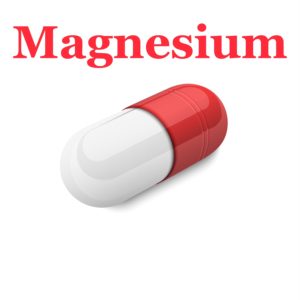Magnesium is one of the most powerful minerals, responsible for over 300 enzyme reactions in the body. Magnesium is a vital electrolyte, and among the biochemical reactions it regulates are protein synthesis, blood-glucose control, and blood pressure, insulin regulation, vitamin D metabolism, bone health, and detoxing. Magnesium also greatly affects heart function, digestion, and sleep.
But that’s all boring, right? What about the fact that Magnesium is a treatment for anxiety? insomnia? constipation? fatigue?
Just a few of the effects of Magnesium:
- Calm:
- Magnesium slows nerve signals leading to a calming and relaxing feeling in the body and brain. This makes magnesium a wonderful natural treatment for those with anxiety, insomnia, and ADHD.
- Energy:
- Magnesium is needed to make ATP. ATP is the energy molecule in the body (that we produce from calories, with the help of Magnesium).
- Bowel Motility
- Magnesium relaxes the muscles of the GI tract making it easier to go to the bathroom
- Magnesium also draws water into the intestine, making it the most natural treatment for constipation
- Detoxing
- Your body needs magnesium to run the many detoxification pathways that your body uses to get rid of metals and free radicals (from normal metabolic processes, as well as pollutants in our environment)
- Heavy metals compete with magnesium for entry into the brain cells and for absorption in the gut. If we have enough magnesium and vitamins/minerals, healthy metals such as aluminum won’t be absorbed as readily.
- Sleep
- Studies show that Magnesium combats insomnia. People take it to promote getting to sleep and staying asleep.
- Reflux and/or that full indigestion feeling
- Magnesium relaxes the sphincter at the bottom of the stomach. This promotes stomach emptying, so food won’t sit like a rock in your stomach (which can lead to reflux).
Deficiency Symptoms:
If you are experiencing any of the following symptoms, you might be deficient in magnesium:
- Muscles cramps or twitching
- Insomnia
- Irritability
- Sensitive to loud noises
- Anxiety
- Palpitations
- Angina
- Constipation
- Headaches, Migraines
- Asthma
- Kidney Stones
- Reflux
- Trouble Swallowing
Additionally, research shows magnesium deficiency is common in those with these conditions:
- Diabetes
- Obesity
- IBS
- Autism
- ADHD
- Depression/Anxiety
In the United States, magnesium deficiency is a serious concern. The reason is simple: many of us eat a diet that contains very little magnesium. The Western-American diet is filled with highly processed, refined foods, white flour, meat, and processed dairy. None of these foods contain magnesium. In addition magnesium is decreased with the intake of alcohol, salt, coffee, profuse sweating, chronic stress, chronic diarrhea, diuretics, antibiotics, and other drugs. It is no wonder everyone needs more magnesium!
Foods high in magnesium include: Wheat bran, wheat germ, brown rice, almonds, cashews, buckwheat, brazil nuts, pecans, walnuts, rye, soy beans, figs, dates, collard greens, shrimp, avocado, parsley, beans, dark leafy greens, and garlic.
But it is often a good idea to supplement. Magnesium glycinate is the best form of magnesium to get past your gut and into your brain and muscles. But if constipation is your challenge, than magnesium citrate or oxide is best.


Great reminder of the function of magnesium and good food sources: Foods high in magnesium include: Wheat bran, wheat germ, brown rice, almonds, cashews, buckwheat, brazil nuts, pecans, walnuts, rye, soy beans, figs, dates, collard greens, shrimp, avocado, parsley, beans, dark leafy greens, and garlic.
This is an excellent and clear blog post. Thank you! I have read somewhere to be cautious about interpreting blood levels of serum magnesium like calcium the blood work may not tell the whole story. Can you clarify?
Yes, good question! Only 1% of your magnesium is in your blood serum. However, lab should take that into account, and so if this 1% is low, that should correlate with your intracellular magnesium being low. I think caution is still a good idea with serum Mg though. I like Mg for anyone who has signs of deficiencies, OR who has issues that Mg can help with (insulin resistance, high BP, constipation, anxiety, etc)…and usually I like Mg for everyone else too-b/c it is so ubiquitous and necessary and hard to get enough thru diet.